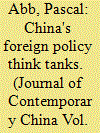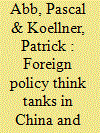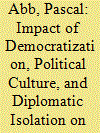|
|
|
Sort Order |
|
|
|
Items / Page
|
|
|
|
|
|
|
| Srl | Item |
| 1 |
ID:
137503


|
|
|
|
|
| Summary/Abstract |
This article provides an overview of activities by Chinese foreign policy think tanks, with a particular focus on developments over the last decade. Covering a sample of prominent institutes, it provides up-to-date information about their academic, advisory and PR functions, and highlights major differences between individual institutes and organizational groups. In line with the findings, I argue that Chinese think tanks have undergone a remarkable increase and professionalization in their academic work, as well as made big strides in improving their footprint in the media. Finally, the article also considers new developments in networking organizations that have been particularly important in bringing experts together to pursue mutual interests, and how these relate to changes in Beijing's international agenda.
|
|
|
|
|
|
|
|
|
|
|
|
|
|
|
|
| 2 |
ID:
142222


|
|
|
|
|
| Summary/Abstract |
The role of foreign policy think tanks (FPTTs) in policy-making has received substantial scholarly attention, with most studies focusing on US-based organizations. In this article, we seek to address this spatial bias by discussing the development and roles of FPTTs in two East Asian countries, China and Japan. China today hosts the second-largest think tank scene in the world, and many FPTTs have received influxes of funding and increased the academic qualifications of their staffers in recent years. Japan also hosts a sizable array of think tanks, but many of them operate on a for-profit basis and do not focus on public policy issues; Japan has very few genuine FPTTs. In both countries, FPTTs are in many ways linked to the government. While they seek to inform and influence foreign and security policy as well as public discourse on international affairs, they usually do not act as agenda setters. By examining the recent case of constitutional reinterpretation in Japan, which aimed to enable collective self-defence, we show how Japanese public intellectuals, including think tankers, helped to legitimize this controversial move and how Chinese FPTTs reacted publicly by providing media commentary in support of the official government line.
|
|
|
|
|
|
|
|
|
|
|
|
|
|
|
|
| 3 |
ID:
178740


|
|
|
|
|
| Summary/Abstract |
Over the past fifteen years, China has turned from a bystander of international peacekeeping operations (PKO) to one of their biggest contributors, often explained in terms of norm adoption or securing Chinese overseas investments.
This article sketches the historical evolution of China’s approach to peacekeeping through a role theory prism, explaining policy shifts through changing Chinese self-images and desired roles on the international stage. By studying influential academic and official discourses surrounding Chinese engagement with PKOs, it details processes of role contestation, and how peacekeeping became served to translate newly adopted roles into concrete policies. Finally, the article closes by examining China’s growing ambitions as a peace-bringer and the emergence of an indigenous doctrine on the peace/development nexus that could undergird future Chinese agency in conflict settings.
|
|
|
|
|
|
|
|
|
|
|
|
|
|
|
|
| 4 |
ID:
158498


|
|
|
|
|
| Summary/Abstract |
Taiwan’s landscape of think tanks, despite having emerged during a time of Leninist one-party governance and state-led economic development not unlike that in Mainland China, is today marked by a substantial agency in conducting both research and advocacy. This sets them apart from their counterparts on the mainland. We ask how this development was shaped by Taiwan’s evolution as a political entity, especially its experience of gradual political liberalization and eventual full democratization by the mid-1990s. In its wake, multiparty competition, factionalism, the emergence of a vigorous civil society, and individual interest groups created an environment in which think-tank services were sought by many competing actors, offering a wide array of funding opportunities for policy research. Additionally, a political culture that stresses expertise and the need to conduct unofficial diplomacy often gave think tanks a privileged position within the system, and they served as key agents in conducting the kind of informal diplomacy made necessary by Taiwan’s loss of diplomatic recognition from the 1970s onwards.
We further offer an overview of Taiwan’s think-tank landscape, describing major groups (or types) of institutes and briefly portraying especially prominent cases within them. Finally, we provide two detailed case studies to show how these institutes operate in practice, and how the need for unofficial diplomacy and a recent government change have shaped their activities.
|
|
|
|
|
|
|
|
|
|
|
|
|
|
|
|
| 5 |
ID:
143613


|
|
|
|
|
| Summary/Abstract |
This paper uses the case of Sino-Southeast Asian relations to gain insights into China’s ability to muster support for its global agenda. The analysis focuses on the regional-global nexus of interstate relations and explores the extent to which the quality of two states’ regional relations influences the likelihood of behavioral alignment in global politics. To this end, we consider a range of potentially influential aspects of Sino-Southeast Asian relations such as the quality of bilateral relations based on recent event data, economic ties and regime similarity as well as measurements of countries’ external alignments and national development levels. We employ a statistical model to search for correlations of these factors with observed trends of voting coincidence in the United Nations General Assembly during the period 1980-2014. We find a strong correlation between the quality of regional bilateral relations and global policy alignment, which indicates that patterns of regional cooperation and conflict impact the trajectory of China’s rise in world affairs
|
|
|
|
|
|
|
|
|
|
|
|
|
|
|
|
|
|
|
|
|